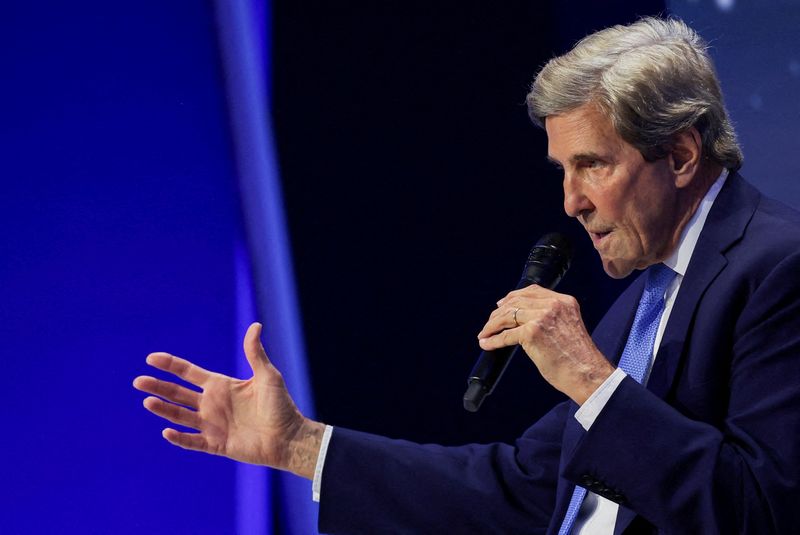By Alexander Cornwell
DUBAI (Reuters) -The United States will work with China to make the United Nations climate negotiations that begin in the United Arab Emirates this week a success, Washington's climate envoy said on Wednesday.
Cooperation between the U.S. and China, the world's two biggest emitters of greenhouse gases, is seen as crucial to securing consensus at the Nov. 30 - Dec. 12 summit, known as COP28.
"We have decided to actually work together to get a successful COP, to get a successful global stocktake," Kerry said of his meeting with his Chinese counterpart this month.
The global stocktake is an assessment taking place at the climate talks on how far off countries are from limiting global heating to 1.5 degrees Celsius above pre-industrial levels.
Kerry and Chinese climate envoy Xie Zhenhua met in California where the sides agreed to the revival of a bilateral climate working group that Beijing had suspended last year.
The U.S. and China agreed to back a new global renewables target and work together on methane and plastic pollution, though differences remain on fossil fuels, among other issues.
"We intend to work hard to see if there's further collaboration that could advance the cause for all of us," Kerry said. "Without China and the United States aggressively moving forward to reduce emissions, we don't win this battle."
The talks in the UAE, a major oil producer, are a critical opportunity for governments to accelerate action on climate change. However, they remain split over the use of fossil fuels, the burning of which is the main cause of climate change.
Kerry, in a call with reporters, urged major producers of fossil fuels to support language that would commit them to phasing out the use of "unabated" fossil fuels - a reference to fuels burned without emissions-capturing technology.
"They need to immediately step up and be part of the solution, not the most significant part of the problem," he said without identifying any particular producer.
In April the Group of Seven industrialised nations, which includes the United States, agreed to speed up the "phase-out of unabated fossil fuels" in what appeared to be a possible breakthrough over their use.

Negotiators have turned to new terminologies in search of a compromise after divisions over the future of fossil fuels failed to lead to a deal on a phase-down at last year's summit.
"We hope we can send a very strong signal that the nations of the world are committed to work together to transition away from fossil fuel emissions in the next three decades. Period. It's critical," Kerry said.